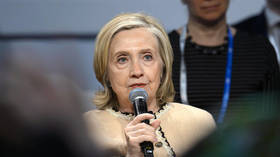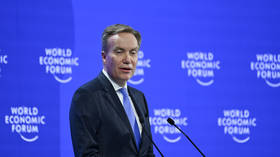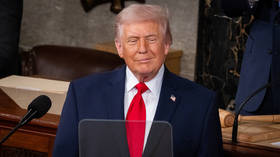Tahrir turbulence: Washington & SCAF as obstacles to change in Egypt
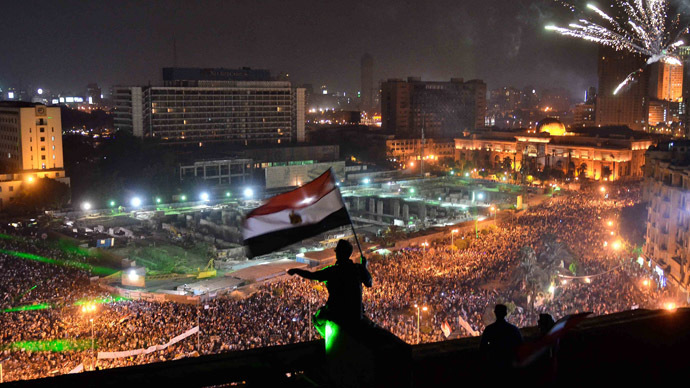
As figures in Egypt’s powerful military collude with the political opposition to form a civilian interim government, what kind of political and economic solutions will the new regime offer, and is Washington’s hidden hand at play?
Political polarization has reached new heights in Egypt following the dramatic overthrow of Mohamed Morsi, the country’s first democratically elected leader. Recent polls taken before the June 30 protests showed that SCAF’s approval rating had reached 94 percent while the Muslim Brotherhood’s rating was at 28 percent and the opposition’s at 38 percent. It’s strange that Egypt’s anti-Morsi activists would place their trust in SCAF given its extensive crackdown on civilian protesters since the revolution began, and certainly no one can deny that the Muslim Brotherhood was isolated during its final days. It is highly unlikely that Morsi would ever be reinstated at this point, and the interim government can be expected to pursue austerity measures, economic restructuring, and a foreign policy in step with Western-Gulf states. Morsi had something that the current rulers of Egypt do not – democratic legitimacy – and despite that only 34 percent of Egyptians took part in the vote, the result should have been respected by the military. Morsi was by no means a democrat, but the Muslim Brotherhood captured the majority in parliament, and their persecution and total exclusion from the interim government is unacceptable.
After sweeping away two presidents since 2011, the original goals of the revolution, embodied in the popular slogan “Bread, Freedom, Social Justice and Human Dignity,” haven’t come close to materializing. For all intents and purposes, life for the average Egyptian is more difficult now than under Hosni Mubarak, and although Morsi’s shortcomings may not have justified a military coup, his tenure was a spectacular failure. Although many perceive Morsi and Egypt’s Supreme Council of the Armed Forces (SCAF) as being hijackers of the 2011 revolution, the bottom line is that the revolutionary fervor emanating from Tahrir Square is not directed against one party or political figure, but against economic conditions and neo-liberal tendencies that have largely remained unchanged throughout the ebb and flow of Egyptian politics in recent times.
Morsi’s year in office saw the doubling of food prices and the
weakening of the Egyptian pound while his administration
negotiated a $4.8 billion loan with the IMF that would have
imposed crippling conditions on the people, including the
slashing of subsides that the poorest rely on. While some 40
percent of Egyptians live in poverty, Morsi’s narrow pursuit of
more liberalization, deregulation and privatization appeared to
many as a continuation of Mubarak-style economics. To be sure,
the Islamist flavor of Morsi’s tenure upset many secular
Egyptians, as well as those in the Coptic Christian community,
but the crux of the issue remains Morsi’s mishandling of the
economy, in addition to his failure to reach out beyond the
Muslim Brotherhood’s political base. Morsi’s approach to foreign
policy was the greatest indication the he was in fact bound by a
Western leash, and the coup in Cairo has left a mark on the grand
chessboard.
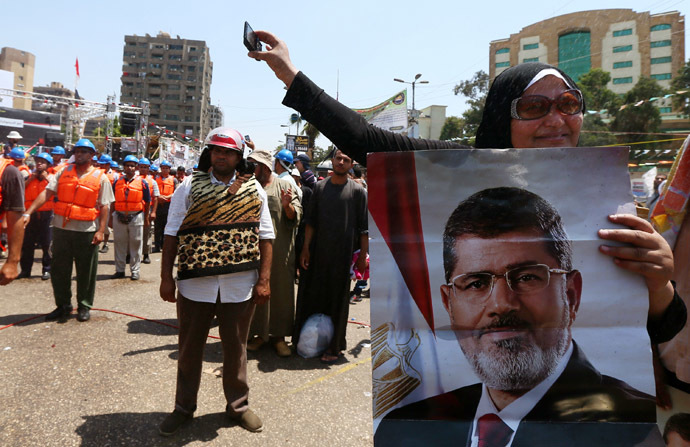
Saudi Arabia & Qatar play geopolitical ping-pong
It’s generally accepted that Morsi and the Muslim Brotherhood were bought and paid for by Doha, which channeled some $17 billion into Brotherhood-led regimes throughout the post-Arab Spring landscape – as such, Morsi’s foreign policy moved in step with Qatar. Shortly before being deposed, Morsi closed down the Syrian embassy in Cairo and pledged allegiance to the jihadist insurgency working to topple Bashar al-Assad. Furthermore, security coordination with Israel became more intimate under Morsi than under Mubarak, while he allowed the destruction of the majority of underground tunnels between Gaza and Sinai that Palestinians had used to smuggle in food and goods. Those pudgy sheiks in Doha were so upset over losing their man in Cairo (and their investments) that the Emir likely gave orders from the top to the Qatari-owned Al-Jazeera news network requesting that the pro-Brotherhood line be toed, resulting in the resignation of 22 staff members over what they allege was “biased coverage” of the events that unfolded.
When the Qataris dropped the ball, the House of Saud was there to pick it up. King Abdullah, Saudi Arabia’s absolute monarch, was one of the first regional leaders to recognize Egypt’s interim government right after the coup – primarily because SCAF Chief General Abdel Fattah al-Sisi is his man. Al-Sisi held his post for less than a year before bringing down Morsi and previously served as Egypt's military attache in Saudi Arabia – he also studied in Washington and previously cooperated with Washington over war games and intelligence operations. Saudi Arabia and the UAE have since stepped up to provide emergency financing for the bankrupt Egyptian state, to the tune of $8 billion. Relations between Doha and Riyadh sway back and fourth between being cordial at times, to outright bitterness. Another sub-plot recently saw the Saudi-US-backed Ahmad Jarba take over the Syrian National Council, marking the notable ascendancy of Saudi influence within the Syrian opposition, a major setback for Qatar.
Are Washington’s fingerprints on the Egyptian coup?
Some may ponder, why would Washington involve itself in the removal of Morsi when he was such a perfect stooge? The fact is that the Americans knew that critical mass was building against the Muslim Brotherhood (some 22 million people signed a petition calling for Morsi’s resignation), which prompted them to give SCAF a reluctant green light to stage a coup, seeing it as the surest bet that Washington would continue to exert control over Egypt and the geopolitically crucial Suez Canal. The US knew which way the wind was blowing, and stepped up financing of anti-Morsi organizations and figures through the National Endowment for Democracy and other quasi-governmental organizations financed through the State Department and USAID. The fact that Washington fell short of referring to the military coup as what it rightfully was lends credence to US complicity.
Moreover, Washington has not changed its plans to deliver four
F-16 fighter jets to Egypt in the coming weeks, which speaks
volumes of the Obama administration’s position on the matter.
Deputy Secretary of State William Burns recently visited Cairo
for talks with the interim government, urging them to move toward
an elected civilian government. However, while attempting to look
neutral, Washington has hardly criticized the military's actions
and its crackdown on the Muslim Brotherhood, and has not called
for Morsi's reinstatement. If one reads between the lines, its
clear that Washington hedged its bets with the Egyptian military
and dropped Morsi like a hot potato once he became a liability.
SCAF receives some $1.3 billion in annual US assistance, and no
matter how one reads the political tea leaves, Washington’s
interests in Egypt are too great, and it has no choice but to
diplomatically, financially and militarily back the product of
the July 3 coup.
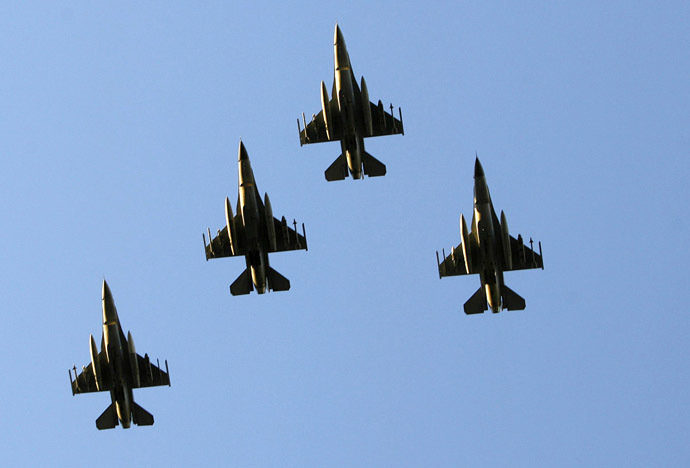
Meet the new boss, same as the old boss
Obama isn’t exactly losing sleep over the changes in Egypt, probably because the new interim government is lined with Western-educated “liberals” that will continue the same political and economic policies as Morsi, and Mubarak before him. Interim President Adly Mansour, former Chief Justice of the Supreme Constitutional Court, had a hand in dismantling the "political isolation" law that prohibited members of the old [Mubarak] regime from contesting elections, and is widely seen as the civilian face acting on SCAF’s behalf. Mansour appointed Hazem el-Beblawi as Prime Minister, a former finance minister and Paris-trained economist who has worked with international financial institutions and taught at the American University in Cairo; a recent editorial in the New York Times called on him to slash Egypt’s energy subsides, a move he whole-heartedly supports. Ahmed Galal, a Boston University-trained economist and Word Bank veteran has been named Finance Minister; Nabil Fahmy, former Egyptian ambassador to the United States, is the Foreign Minister who also served as the head of the opposition National Salvation Front, whose members have received funding from the State Department-linked National Endowment for Democracy.
The icing on the cake is the appointment of opposition leader Mohamed ElBaradei as interim Vice President, who is a trustee of the US International Crisis Group and a former senior UN diplomat, who has been a staunch advocate of IMF medicine for Egypt. Some of the loudest voices calling for Egypt’s democratization during Mubarak are now key figures in the interim government. Members of the opposition with no public mandate to speak of are now in power after jailing the democratically elected president, a move that reflects their commitment to democracy as a principle, or lack thereof. If mass protests against Morsi amounted to a majority at the ballot box, the opposition could have constitutionally and legally removed him from power through a scheduled parliamentary vote – what the Egyptian people got was an opportunistic collusion between SCAF and members of the opposition to usurp power.
One of Morsi’s glaring shortcomings was his inability to bring about a system of compromise and inclusiveness with needed checks and balances, and seeing as how the current government has completely isolated the Islamist political factions, they appear to have set themselves up to rule in much the same way. Morsi supporters will not soon concede to a sullen acceptance of the coup, but any armed insurrection on the part of the Muslim Brotherhood won’t go down well, seeing as SCAF has them severely out-gunned. The military’s strong grip over the economy (estimates suggest that military-connected enterprises account for 10 percent to 40 percent of the Egyptian economy) and its monopoly on force make it a political construct that won’t be blown down by revolutionary winds so easily, and as long as it enjoys backing from the United States, expect SCAF to remain firmly entrenched. It should be of no surprise if the many who made their voices heard in Tahrir Square take to the streets yet again in the coming months with one thing on their mind – third time's the charm.
The statements, views and opinions expressed in this column are solely those of the author and do not necessarily represent those of RT.
The statements, views and opinions expressed in this column are solely those of the author and do not necessarily represent those of RT.




